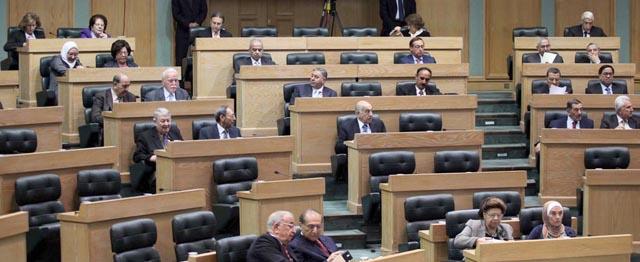You are here
Lawmakers agree to keep ‘resistance against Israel’ off State Security Law
By Khaled Neimat - Apr 17,2014 - Last updated at Apr 17,2014

AMMAN — Parliament on Thursday endorsed the State Security Court (SSC) Law after both chambers agreed to remove an addition made by the Lower House to the law, excluding “acts of resistance” against Israel from the bill’s jurisdiction.
During their Thursday joint session, convened to resolve their dispute over two draft bills (the other is the illicit fortune law), the MPs accepted the argument of the senators and Prime Minister Abdullah Ensour, who said that such an addition would suggest that resistance is actually a crime.
“Occupation is the crime and not resisting it,” the premier said in his remarks during the session.
Veteran MP and jurist Abdul Karim Dughmi agreed, saying he had second thoughts after he listened to the explanation.
He noted that there is no provision in Jordanian laws that prohibts resistance against occupation.
The Upper House has recommended that the government submit a draft anti-terrorism law that specifies the crimes falling under the category of terrorism, suggesting that the “resistance” issue can be discussed in that context.
The amended SSC Law limits the jurisdiction of the court to five crimes specified in the Constitution: treason, espionage, terrorism, drugs and money counterfeiting.
Meanwhile, the Parliament could not reach a final decision over their dispute in connection to the draft illicit fortune law, after discovering a typing mistake in the joint session’s agenda.
However, the two chambers resolved one of their disputes when they both agreed to name the draft bill as the “illicit fortune law” avoiding the use of “How did you earn it [fortune]?”, which is a cliché Arabic pharse use to express doubts over the sources of money and assets.
The Senate rejected the tag as “unnecessary”.
Last year, MPs rejected the Senate’s amendments to the bill, insisting on their decision to annul the anti-illicit fortune department at the Justice Ministry and vesting its responsibilities in a judicial commission to be established for this purpose and function under the Judicial Council.
The new commission must be independent and include three judges as members, along with technocrats, the House argued.
Parliament will meet for another joint session next week to reach a final decision over this draft bill.
Chairperson of the joint meeting, Abdur-Ra’uf S. Rawabdeh, said the draft law in question must be finalised before the end of the current parliamentary session early next month.
Parliamentary sources and observers say it is very likely that His Majesty King Abdullah will summon Parliament to convene for an extraordinary session to discuss and endorse reform-related bills.
Related Articles
The Senate on Monday endorsed the 2002 temporary agriculture law after introducing amendments, the Jordan News Agency, Petra, reported.
After keeping the draft illicit fortune law on hold for a few months due to a difference of opinion between the two Houses of Parliament, lawmakers on Monday endorsed the bill.
The Senate on Thursday rejected for the second time deputies’ amendments to the draft 2013 State Security Court (SSC) Law that exclude “acts of resistance against Israel” from the SSC’s jurisdiction, which is concerned with handling terrorism cases.













